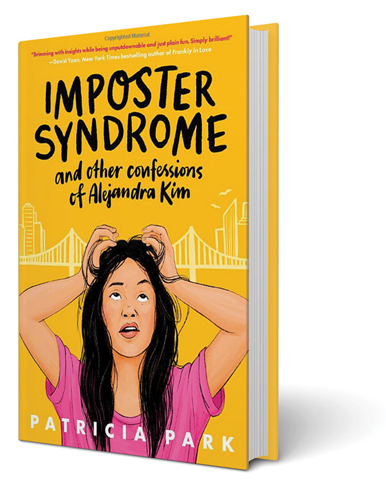
Ale (AH-lay), the daughter of Korean Argentines and protagonist of CAS professor Patricia Park’s second book, has a “súper-Korean face” and a “súper-Spanish first name.” She doesn’t fit in at her Manhattan prep school—or at home in Jackson Heights—and she just wants to get through her senior year so she can attend a prestigious New England college. Set in the Queens “multiverse” where Park grew up, Imposter Syndrome and Other Confessions of Alejandra Kim features a main character whose wit and grit will appeal to readers of all ages.
What’s it like to write about a place that’s so familiar to you?
Queens is one of the most ethnically and linguistically diverse places in the world, but Fitzgerald calls it “a valley of ashes” in The Great Gatsby. I spent my formative years rejecting my hometown as a literary destination. I thought our stories were untold because they were unworthy. It’s only as an adult that I feel a sense of responsibility to tell our stories in the right way.
What prompted you to write this young adult (YA) novel?
When I first started teaching at AU, so many students said, “I want to write YA,” and I loved how fresh and honest and intimate the voice of YA was. Experiences unfold in real time, and the reader is invited along on that journey [with] the characters.
What is the significance of the word “confessions” in the title?
Alejandra didn’t want to admit to herself that she was feeling imposter syndrome, even though she’s constantly code-switching between working-class Queens and her mostly White, progressive, “woke” school, Quaker Oats. As the story progresses, we learn things about her family history, things she wishes she hadn’t said and done. There are so many little confessions that she doesn’t immediately reveal to the reader because she’s still processing them for herself.
Did you have any input in choosing the narrator for the audio version of the book?
I listened to all the audition tapes, and everyone was unanimously pointing to this talented actor named Felisha Wong. It’s such a weird and wonderful experience to hear your own work being read aloud back to you. She was layering in textures and color and range in a way that, as a non-actor, I can’t do in a public reading.
Has there been any talk of a film or television version of Imposter Syndrome?
There’s been strong interest. I’ve been in conversations with Hollywood and I’m working with some talent there, but I don’t think I’m allowed to say anything more at the moment!
What’s next for you?
What’s Eating Jackie Oh? is about an aspiring teen chef who expresses her identity through food. She’s battling anti-Asian hate, pushing back against her parents, who want her to fulfill their model minority Ivy League dream, and ends up on a reality TV cooking competition.
Epilogue
What was the last great book you read?
Olga Dies Dreaming [by Xochitl Gonzalez]. It’s about a woman of Puerto Rican descent, Brooklyn born and raised, who’s a wedding planner, but she’s dealing with family issues and gentrification. I have a lot of ambivalent feelings about “ethnic neighborhoods” being discovered and becoming trendy, and the novel deals with a lot of that.
Favorite bookstore or library?
Kew and Willow Books is my new special-place-in-my-heart store. They were our off-site bookseller at an event in Jackson Heights with six Queens novelists honoring another writer. I was busy signing, and after a couple hours they were ready to leave. By the time I ran over, the books were already packed up, and I’m like, “I’m so sorry, can I still buy the other writers’ books?” They started unpacking the books. It was no problem.
Best time to read?
I read as procrastination. When my own work is not going well, I read someone else’s and it’s like, “How did they find such an elegant solution?” It’s like an ego check.
If you’re struggling to finish a book, do you push through or put it down?
If I sense that a writer is just indulging themselves and not thinking about the reader’s experience, that doesn’t feel kind to the reader. I won’t keep reading that kind of book.
Any guilty pleasures?
Cookbooks! It’s so nice to have a solution for something: Here are the ingredients, these are the quantities, this is the process, and this is the result. We don’t have that in writing. In my classroom, it’s like, “Let’s try 10 different versions of the recipe,” and maybe one of them will stick. But in a cookbook, you can learn how to make a real soufflé.
Is there a book you’ve reread often?
Jane Eyre. The first time I read it, when I was 12, I was struck by this character who self-identifies as “poor, obscure, plain, and little.” When you’re a preteen, everything is about being the opposite of those things. I loved Jane Eyre’s scrappiness. But when I reread it as an adult, I realized, “Holy cow, Charlotte Brontë is funny.” I love the little quotidian moments of humor. I tried to weave some of those Brontëan Easter eggs into Re Jane, my first novel, a Korean American retelling of Jane Eyre.
You’re hosting a dinner party for three writers—dead or alive. Who’s on the guest list?
Kurt Vonnegut, for sure, and Edith Wharton, so she could school me on how to have manners: “No, no, Ms. Park, you must have the dinner fork on this side.” I was a writer in residence at her home, the Mount. [Wharton] designed her dining table at just the right angle with just the right seating for what she thought was most conducive for the best party. Shakespeare would be the third. I want to ask him if he wrote all those sonnets and plays himself.